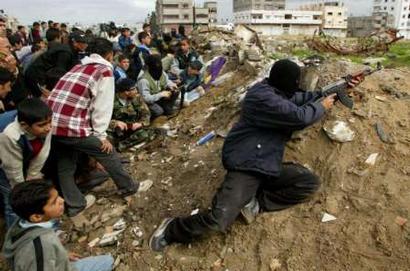
From Nakba Survivor to 1948 Arab
Click here to listen to the interview
http://www.islamonline.net/English/Multimedia/Library/MuslimAffairs/2008/05/01.shtml
" When the forces approached us … I still remember .. we were sitting — me, my father, my mother, my older brother, my two sisters — in the lower story of our house and my father looked at us and said:
You know guys, just go … go!
Where to go?
He said: just go …
He gave everyone of us 10 Palestinian pounds and he said .. just go ..
Just imagine how parents tell their youngest boy just go .. where to, they didn’t know
It was so terrifying …
My parents didn’t want to see us killed or to see my sisters rapped at the reputation of the Zionist forces that were spreading around.
… and the story starts from there"
Naji Farah tells his story
Click here to listen
http://www.islamonline.net/servlet/...agename=Zone-English-Muslim_Affairs/MAELayout
Former Prime Minister of Syria Khalid al-Azm recalled in his memoirs:
Since 1948 it is we who demanded the return of the refugees to their country, while it is we who made them leave it. […]
We brought disaster upon one million Arab refugees, by inviting them and bringing pressure to bear upon them to leave their land, their homes, their work and their industry. We have rendered them dispossessed, unemployed, whilst every one of them had work or a trade by which he could gain his livelihood.
After the war, a few Arab leaders tried to present the Palestinian exodus as a victory by claiming to have planned it. Iraqi Prime Minister Nouri Said was later quoted as saying: "We will smash the country with our guns and obliterate every place the Jews shelter in. The Arabs should conduct their wives and children to safe areas until the fighting has died down."
Contemporary Jordanian politician Anwar Nusseibeh believed that the fault for the exodus and military loss was with the Arab commanders:
"the commanders of the local army thought in terms of the revolt against the British in the 1930s. The rebels had often retreated to the mountains, which made sense, as the British had not sought to take control of the country. But the Jews were fighting for complete domination, so the fighters had erred in withdrawing from the villages instead of defending them […]. He blamed himself as well. 'I underestimated the strength of my own people,' he wrote. […] His central thesis, however, was that the Palestinian Arabs could have won the country had their leaders not sabotaged the war effort and known how to cooperate."
The Arab National Committee of Haifa, the Arab leadership in Haifa in 1948, wrote and delivered a report on the flight of roughly 60,000 Arabs from Haifa. The report said, "[T]he removal of the Arab inhabitants from the town was voluntary and carried out at our request."
"Brotherly advice was given to the Arabs of Palestine to leave their land, homes and property and to stay temporarily in neighboring, brotherly states, lest the guns of the invading Arab armies mow them down," wrote Habab Issa of Al-Hoda, the leading newspaper for Lebanese Maronites in the United States. A Muslim weekly newspaper in Beirut similarly reported, "Who brought the Palestinians to Lebanon as refugees, suffering now from the malign attitude of newspapers and communal leaders […]? The Arab States [sp], and Lebanon amongst them, did it!"
Mahmoud Abbas, at the time Prime Minister of the Palestinian Authority, would later recall: "The Arab armies entered Palestine to protect the Palestinians from the Zionist tyranny but, instead, they abandoned them, forced them to emigrate and to leave their homeland, and threw them into prisons similar to the ghettos in which the Jews used to live."





